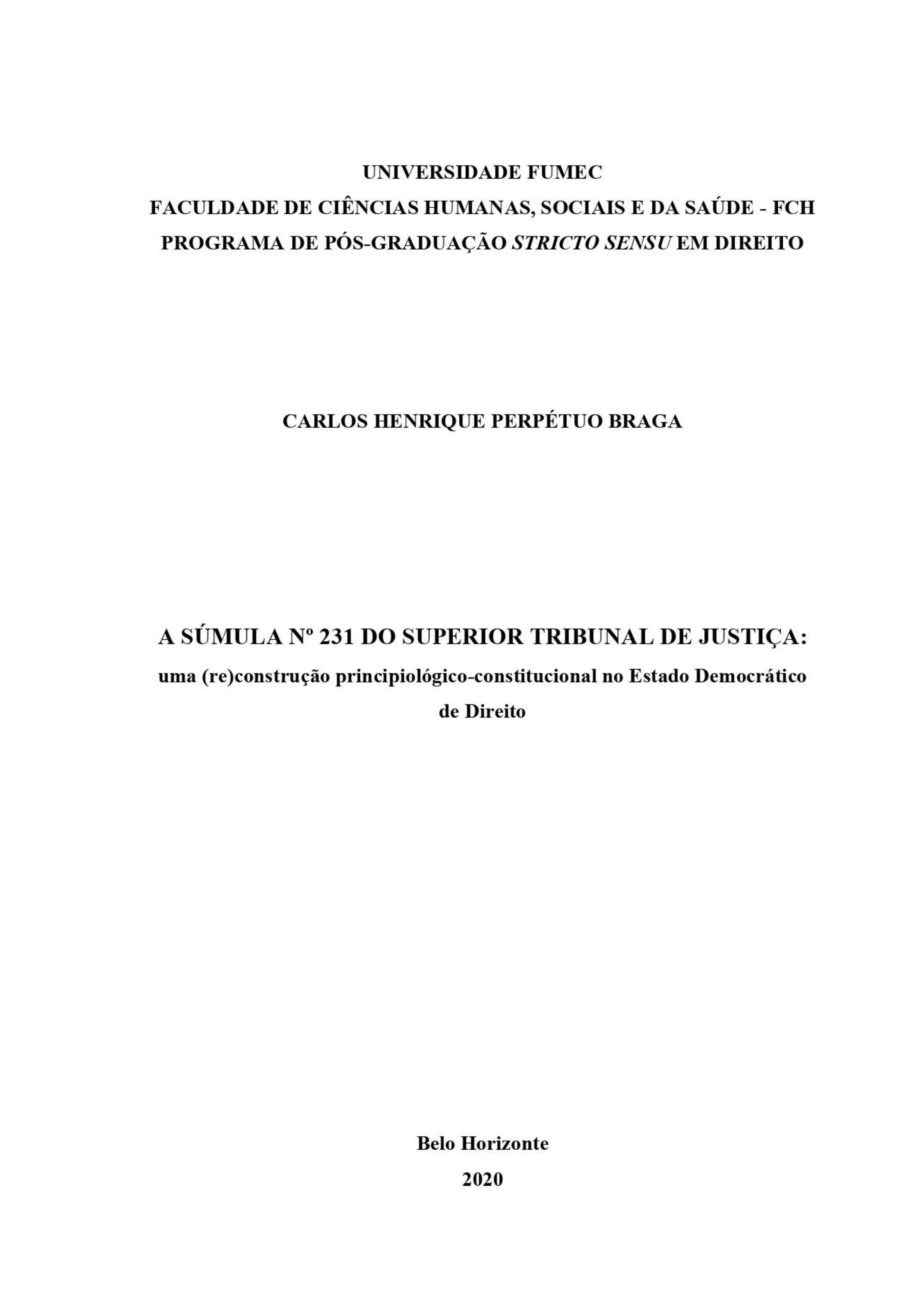A súmula nº 231 do Superior Tribunal de Justiça: uma (re)construção principiológico-constitucional no Estado Democrático de Direito

Visualizar/
Data
2020Autor
Braga, Carlos Henrique Perpétuo
xmlui.mirage2.itemSummaryView.MetaData
Mostrar registro completoResumo
Esta pesquisa tem como temática a Súmula nº 231 do Superior Tribunal de Justiça, que veda a
redução da pena provisória abaixo do mínimo legal. O referido verbete contraria expressa
disposição legal, notadamente o art. 65 do Código Penal, e, por isso, viola vários princípios de
natureza constitucional, ínsitos à aplicação da sanção penal, notadamente, a legalidade (ou
reserva da lei), a pessoalidade, a individualização e limitação das penas, conferindo a
situações distintas soluções idênticas. Como problema de pesquisa, indaga-se se o enunciado
da Súmula nº 231 do Superior Tribunal de Justiça se alinha ao devido processo constitucional
e às previsões contidas no ordenamento jurídico brasileiro, em especial, ao art. 65, caput, do
Código Penal. Afirma-se inicialmente, como hipótese de pesquisa, que os precedentes da
Súmula nº 231 do Superior Tribunal de Justiça adotam premissas incompatíveis com a
garantia fundamental da jurisdição e com o devido processo constitucional, violando
frontalmente os princípios mencionados, além do princípio máximo do Estado Democrático
de Direito. Para o desenvolvimento da pesquisa, adotar-se-ão os conceitos de processo
constitucional e de Estado Democrático de Direito, entabulados por Ronaldo Brêtas de
Carvalho Dias, e sua compreensão una de poder (exercido exclusivamente pelo povo),
capazes de balizar o exercício da função jurisdicional em bases efetivamente democráticas. O
objetivo geral da pesquisa é, portanto, estabelecer crítica ao enunciado da Súmula nº 231 do
Superior Tribunal de Justiça e sua aplicação, buscando verificar a sua compatibilidade com o
devido processo constitucional. No que se refere aos demais aspectos metodológicos, a
pesquisa se orienta pelo método hipotético-dedutivo, operando-se a partir e pesquisa
bibliográfica, nacional e estrangeira, além da pesquisa jurisprudencial. The theme of this research is Precedent 231 of the Brazilian Superior Court of Justice, which
prohibits the reduction of the provisional penalty below the legal minimum. Said entry
contradicts express legal provision, notably art. 65 of the Brazilian Penal Code, and, therefore,
violates several principles of a constitutional nature, intrinsic to the application of the penal
sanction, notably, the legality (or reservation of the law), the personality, the
individualization, and limitation of sentences, giving different situations different identical.
As a research problem, it is asked whether the statement in Precedent 231 of the Brazilian
Superior Court of Justice is in line with due constitutional process and with the provisions
contained in the Brazilian legal system, in particular, with art. 65 of the Brazilian Penal Code.
It is initially stated, as a research hypothesis, that the precedents of Precedent 231 of the
Brazilian Superior Court of Justice adopt premises incompatible with the fundamental
guarantee of jurisdiction and with due constitutional process, violating the mentioned
principles head-on, in addition to the maximum principle of the Democratic State right. For
the development of the research, the concepts of constitutional process and Democratic Rule
of Law, introduced by Ronaldo Brêtas de Carvalho Dias, and his unique understanding of
power (exercised exclusively by the people), capable of guiding the exercise of jurisdictional
function on effectively democratic bases. The general objective of the research is, therefore,
to criticize the statement of Precedent 231 of the Brazilian Superior Court of Justice and its
application, seeking to verify its compatibility with the due constitutional process. About the
other methodological aspects, the research is guided by the hypothetical-deductive method,
operating from and bibliographic research, national and foreign, in addition to jurisprudential
research.
